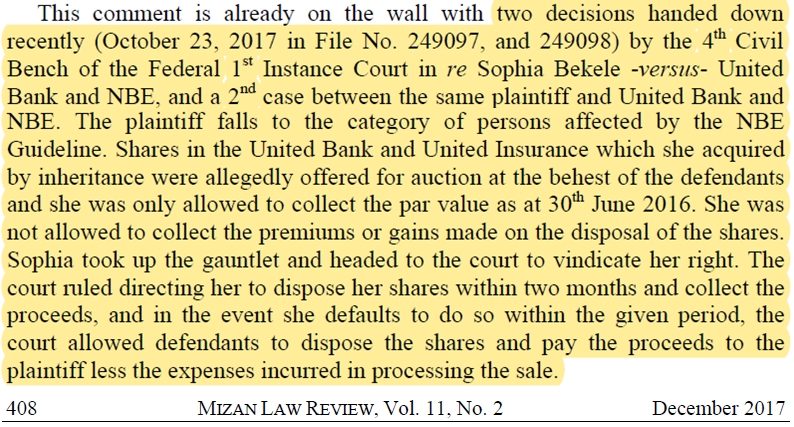“Sophia took up the gauntlet and headed to the court to vindicate her right”
The National Bank of Ethiopia (NBE), the agency in charge of regulating the financial sector of the country, will soon introduce a new regulation that will allow Ethiopians in the diaspora to invest in the financial sector that includes banking, insurance and micro finance.
The Council of Ministers during its extraordinary meeting approved the Draft Banking Business Proclamation, allowing Diaspora citizens to establish banks in Ethiopia. This was indicated by Yinager Desse (PhD), Governor of NBE, who was recently appointed recently by the reformist Prime Minister Abiy Ahmed. The draft regulation of NBE, will be presented to the relevant organs for comment and is welcomed is expected to be approved, according to Yinager, who briefed reporters in his office this morning reported Capital Ethiopia, a leading weekly newspaper.
With recent incidents, banks were forced by the Central Bank to identify Ethiopian shareholders and non-Ethiopians and to then sell the shares of non Ethiopians, who would change their citizenship to another nationality after purchasing shares of local banks or securing inheritances from family when they were not Ethiopian.
During that time the government ordered banks to sell the shares in an opening bid and settle the extra amount of the share value to the government. This meant banks that might consider one share as having a 1,000-birr value, may sell out the value by, for instance, 10,000 birr, and then transfer the extra 9,000 birr to the government by taking the original value which was 1,000 birr even though that money is not as valuable now since ten or twenty years may have passed.

Ms. Bekele, a global entrepreneur and the CEO of DotConnectAfrica (DCA) Group – one of the contenders for the dotAfrica top-level internet domain (still in litigation with ICANN at Los Angeles Superior Court)– lost her inherited shares after they were to be auctioned by the United Bank and Insurance Companies.
Although many have objected the decision and grumbled about its fairness, Sophia is the first to challenge central bank’s decision with her lawyers taking the case to the Lideta First Instance Court.” wrote Addis Fortune, a leading business news paper in Addis.
She was one of the thousands of foreign nationals of Ethiopian origin who have lost shares after the National Bank of Ethiopia (NBE) instructed banks and insurance firms to auction shares under their holdings but pay them at par values of initial formations. The balance between par value and current market offers was transferred to the national treasury. Ethiopia has laws that ban foreign nationals from owning shares in the financial sector,” states Addis Fortune
The latest amended proclamation also allows the existing banks to mobilize finances from not only local sources but overseas sources with the goal of expanding the country’s economic growth.
Experts at the Central Bank said that the government’s current strategy is creating a feeling of ownership in the Diaspora community. “The Trust Fund is one such strategy. Other financial sectors like insurance and microfinance schemes will also be opened for the Ethiopian community abroad,” a source at the National Bank of Ethiopia told Capital.
Financial experts explained that the current decision would allow the country to get more foreign currency through investment in the financial sector besides mobilizing deposits of foreign currency at existing banks.
On commenting about the case, Sophia Bekele told ITBusinessDirect,
We congratulate the current government for upholding what is right, however work still remain to be done in separating the investors from the inheritors, which has been the main contention of my case. We will thus be pursuing that further and expect a reversal of decision on the matter. She added that “What the previous government did was illegal and unjust, particularly on the blanket treatment of inheritors vs. investors. We expect the new law to redress that. Imagine siblings from the same family unit being treated differently on their inherited assets just because of their citizenship. It makes no sense al all.”
Full story here Capital Ethiopia and NewBusiness Ethiopia





